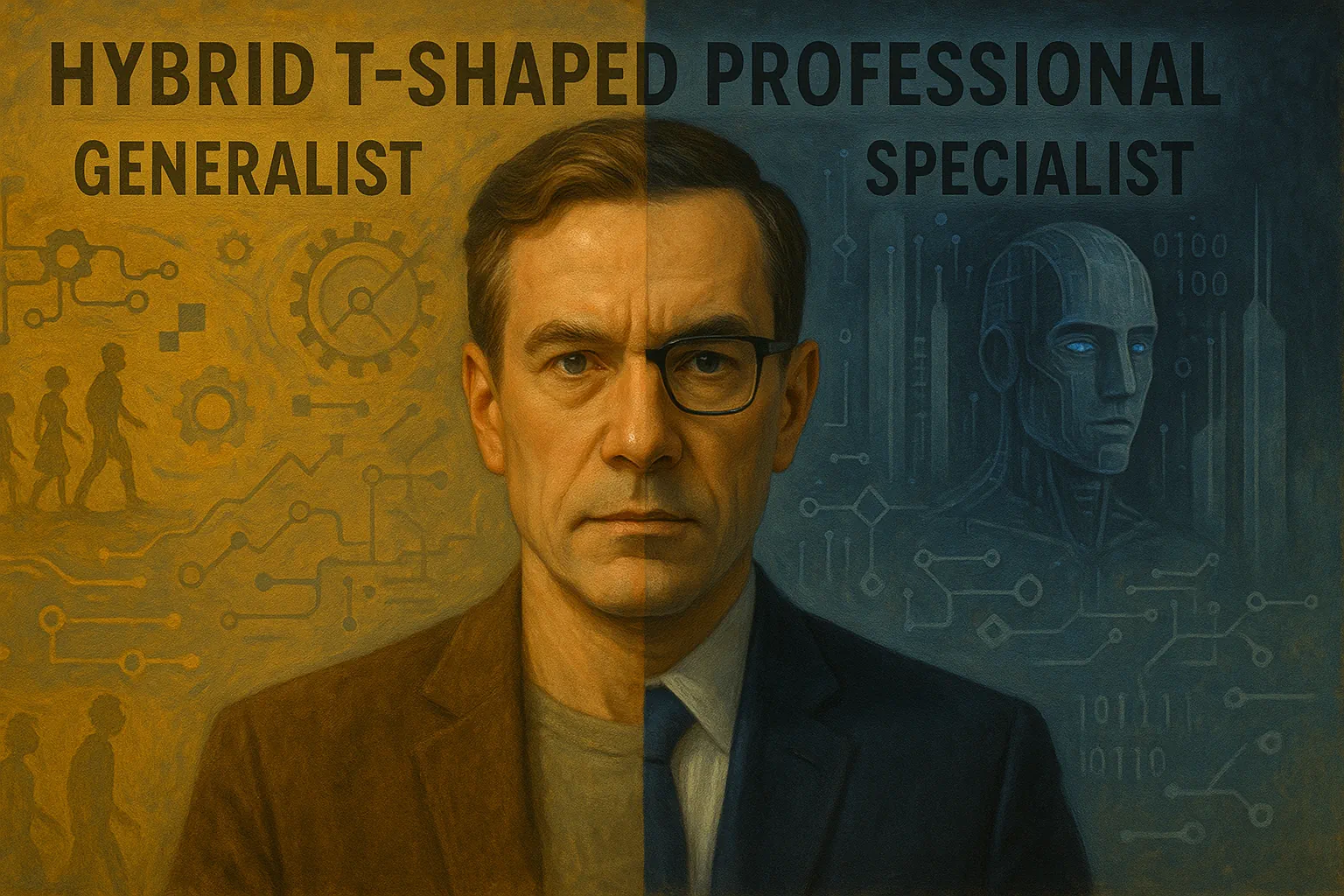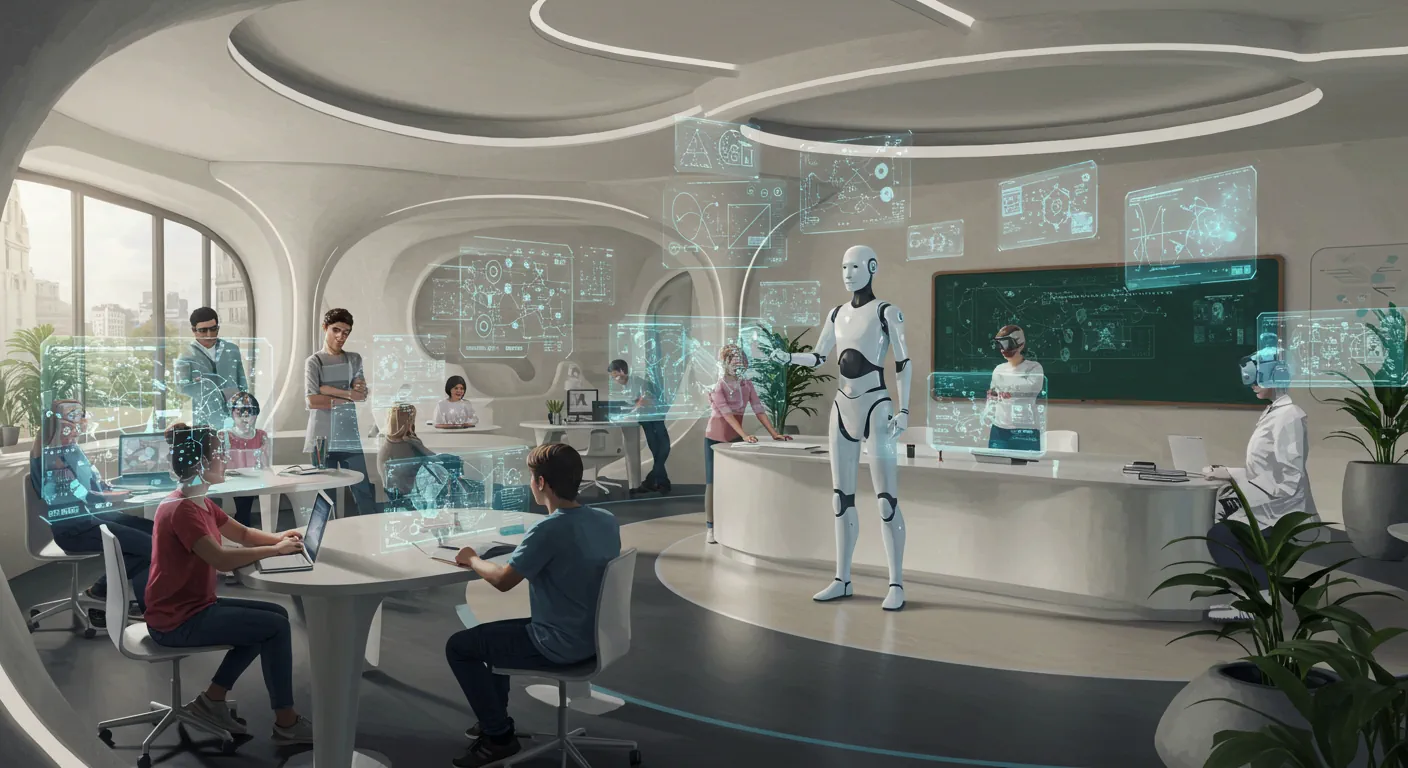The professional landscape is undergoing a significant shift, driven by the increasing influence of Artificial Intelligence. Expertise used to mean deep specialized knowledge and expertise, but now AI is making such knowledge and skills widely available to all and automating tasks that once took years to master.
This article examines the complex relationship between AI, generalists, and specialists. We will explore how AI not only enhances capabilities across the professional spectrum and enables new models of expertise but also introduces disruptive forces to established roles. From changes in core responsibilities to challenges in keeping their position as leading experts, AI is both unsettling traditional structures and creating opportunities for professional adaptation. Crucially, we will also highlight the enduring and essential value of uniquely human contributions in navigating this increasingly automated future.
The Traditional Divide: Generalists vs. Specialists
Historically, professional environments have often featured a clear distinction between generalists and specialists. Specialists were valued for their profound, concentrated knowledge within narrowly defined areas, typically acquired through extensive formal education and practical experience. Generalists, conversely, were valued for their breadth of knowledge, their ability to synthesize information across disciplines, and their capacity for adaptation, often excelling in leadership or integrative roles.
This structure made sense in an information-limited world. Specialists served as the custodians of deep knowledge, while generalists provided the connections that integrated different areas of expertise. Both roles were necessary, yet their functions rarely overlapped significantly. Specialists focused on precision and execution within their domain; generalists concentrated on planning and strategic coordination. This division was reflected in organizational structures, job classifications, and educational pathways.
However, the growth of digital tools and, more recently, AI, has begun to lessen these rigid boundaries. Increased access to online learning platforms, comprehensive knowledge repositories, and sophisticated collaborative technologies is enabling professionals to build competence across multiple areas.
AI Empowers Generalists: Expanding Capabilities

AI is granting generalists significant new capabilities. By embedding domain-specific knowledge and analytical power into accessible tools, AI substantially reduces the reliance on specialist intermediaries for many routine or even moderately complex tasks. This fundamental change allows generalists to extend their influence into areas previously inaccessible due to a lack of specialized knowledge or technical proficiency.
AI as a Knowledge Assistant
Generalists, known for their adaptability and understanding of how systems work, can now leverage AI to generate outputs that approach or even rival those of specialists in certain contexts. Whether performing financial modeling, segmenting customer bases, generating visual designs, or reviewing legal documents, AI functions as both a powerful knowledge assistant and a significant productivity enhancer. The barriers to entry in traditionally siloed domains are being lowered, fostering the emergence of professionals capable of operating effectively across multiple disciplines.
Navigating the Risks of Broadened Scope
However, this newfound capability is not without inherent risks. Without the deep contextual understanding possessed by specialists, generalists leveraging AI tools may inadvertently overlook critical nuances, regulatory requirements, or domain-specific pitfalls. While AI tools can provide a level of surface competence, they do not replicate years of accumulated experience and tacit knowledge.
There is a tangible risk that empowered generalists might attempt tasks beyond their actual expertise, leading to suboptimal decisions or unintended negative consequences. This underscores the continued necessity of specialist consultation, rigorous review processes, and robust cross-functional collaboration, even within an AI-augmented workflow.
- Positive Application: A product manager at a technology startup utilizes large language model-based tools to analyze extensive customer feedback, identify emergent trends, and formulate proposals for new features. They also integrate AI-powered design tools to rapidly prototype user interfaces and employ predictive analytics to assess potential product-market fit. Previously, these tasks would have required extensive collaboration with dedicated UX designers, data analysts, and product researchers. Now, the generalist product manager can independently drive early-stage iterations, accelerating innovation cycles and enhancing their strategic value to the organization.
- Potential Pitfall: A generalist consultant in a mid-sized firm employs AI tools to draft a legal compliance framework for a client operating within a highly regulated sector. Lacking deep expertise in the specific applicable legislation and failing to appreciate the nuances of compliance risk within that industry, the generated framework omits several critical obligations. This oversight is subsequently identified during an external audit, resulting in significant regulatory penalties for the client and reputational damage for the consultancy.
AI Augmentation: Enhancing Specialist Depth

While AI is enabling generalists to broaden their scope, it is simultaneously and significantly enhancing the capabilities of specialists. Rather than rendering deep expertise obsolete, AI empowers specialists to delve even further into the complexities of their respective domains. By automating repetitive or time-intensive tasks such as information synthesis, pattern identification within vast datasets, or routine data entry, AI frees specialists to dedicate their time and effort to higher-order challenges demanding expert judgment, creative problem-solving, and nuanced domain insight.
AI as a Specialist’s Force Multiplier
In this context, AI functions as a force multiplier for specialists, enhancing both the depth and breadth of their output, thereby increasing their productivity and capacity for generating novel insights. Far from posing an existential threat, AI offers specialists the opportunity to operate closer to the leading edge of their fields. The genuine risk lies not in technological displacement but in professional stagnation; specialists who fail to integrate AI into their workflows risk falling behind peers who actively embrace these tools.
Furthermore, AI can facilitate a broader, more strategic perspective for specialists by exposing them to insights from adjacent disciplines and highlighting new contexts for applying their core skills. The wealth of informational resources available to AI can enable a specialist in one domain to identify parallels and connections in seemingly unrelated fields, potentially sparking innovation or opening avenues for novel collaborations.
For instance, a biomedical researcher might leverage AI tools to analyze patterns in climate data, revealing previously unrecognized links between environmental factors and disease prevalence. Similarly, an engineer with a deep understanding of fluid dynamics might find that their expertise is highly relevant to challenges in sustainable architectural design. In this way, AI can help specialists cultivate a capacity for cross-disciplinary thinking while retaining their foundational deep knowledge, thereby amplifying their potential impact across diverse fields.
Managing Risks in Cross-Domain Application
However, this expanded perspective also carries potential risks. Specialists venturing into adjacent domains through AI-driven exploration may lack the necessary contextual understanding to navigate those fields responsibly. Misinterpreting data, overlooking critical regulatory constraints, or making unfounded assumptions outside their core expertise could lead to flawed conclusions or misaligned strategies. Moreover, the confidence instilled by AI tools could inadvertently lead to overreach, where specialists assume transferable mastery without sufficient grounding in the new domain.
Prudence, intellectual humility, and genuine interdisciplinary collaboration remain essential to ensure that the benefits of cross-domain application are realized without introducing unintended and potentially detrimental consequences.
- Positive Application: A biomedical researcher specializing in genetic disorders employs AI to analyze large environmental datasets, uncovering a statistically significant correlation between localized air pollution levels and specific gene expression changes observed in urban populations. This novel insight opens entirely new avenues for research and facilitates valuable collaborations with environmental scientists and public health policymakers, significantly amplifying the societal relevance and impact of their specialist knowledge.
- Potential Pitfall: An engineering specialist applies their expertise in mechanical design to the development of novel medical devices, utilizing AI-generated conceptual designs derived from unrelated industrial sectors. Without adequate understanding of stringent medical device regulatory requirements, anatomical constraints, or clinical use-case nuances, the resulting design incorporates fundamental safety flaws discovered only during rigorous testing phases. The project faces significant delays and necessitates substantial corrective input from healthcare professionals to rectify avoidable design missteps.
The Emergence of Hybrid ‘T-Shaped’ Professionals

The convergence of generalist adaptability and specialist depth is giving rise to a new and increasingly valuable professional archetype: the T-shaped professional. These individuals possess deep expertise in at least one specific domain (represented by the vertical bar of the “T”) coupled with a broad understanding and functional competence across multiple related or adjacent fields (represented by the horizontal bar). In the age of AI, this profile becomes both more attainable and strategically valuable.
Building Lateral Competence with AI
AI facilitates the bridging of knowledge gaps, enabling professionals to build lateral competence more rapidly and effectively without requiring years of formal retraining in a new discipline. A graphic designer can acquire foundational knowledge of digital marketing strategy through AI-powered learning assistants; a software developer can gain insights into user psychology by interacting with conversational AI tools. The outcome is a workforce that is inherently more agile, collaborative, and capable of tackling complex problems from a holistic perspective.
Enhancing Inter-Specialist Communication
A particularly valuable outcome of this developing cross-disciplinary capability is the potential for improved communication and collaboration between specialists from different fields. Distinct domains often develop their own highly technical languages, conceptual frameworks, and methodologies, which can create significant barriers to effective interdisciplinary teamwork.
Generalist skills, particularly when augmented by AI, can function as a crucial translation layer, helping specialists understand the perspectives and priorities of adjacent fields and articulate their own expertise more clearly to non-experts. Even if a specialist does not directly utilize generalist tools in their core work, possessing this connective insight can streamline complex projects, minimize misunderstandings, and unlock powerful new synergies between disciplines.
- Illustrative Example: An environmental scientist specializing in climate modeling leverages AI tools to translate complex technical model outputs into accessible reports for policymakers, simulate the potential impacts of different policy interventions, and generate compelling data visualizations. While not formally trained as a communications specialist, legal expert, or policy analyst, their ability, augmented by AI, to integrate sufficient knowledge from these adjacent fields enables them to drive systemic impact and influence policy outcomes. This form of hybrid fluency is becoming increasingly sought after in complex problem domains.
Educating for the AI Era: Adapting Skills and Learning

Educational systems globally must fundamentally evolve to adequately prepare individuals for the demands of an AI-enhanced economy. Current curricula often retain a strong emphasis on rote memorization and the development of narrowly defined skills, capabilities that are increasingly susceptible to automation.
Rethinking Subject Silos
In traditional educational settings, subjects such as geography, history, and mathematics are frequently taught in isolation, despite their profound interconnections and relevance in the real world. AI presents a significant opportunity to help students and educators make these vital connections more explicit, thereby fostering the development of adaptable, transferable skills such as critical thinking, complex problem-solving, systems thinking, and creative application of knowledge that can be applied effectively across diverse disciplines.
For a maths teacher, this means focusing less on rote calculation and more on conceptual understanding and problem formulation in real-world contexts. For a physics teacher, it involves guiding students to interpret AI-driven simulations and data analysis, emphasizing the scientific method and interdisciplinary links. For an art teacher, it shifts the focus from pure technical skill to fostering unique human creativity, critical judgment, and understanding the cultural context, using AI as a tool for exploration rather than a replacement for artistic vision.
Assessing Higher-Order Skills
Equally critical is a fundamental rethinking of how we assess learning outcomes. Traditional examinations often prioritize the recall of factual information and isolated knowledge components. However, in an AI-augmented world, success is increasingly contingent upon the ability to analyse, synthesize, critically evaluate, and creatively solve complex problems.
This leads to an intriguing possibility for future assessment methodologies: rather than simply asking candidates to provide pre-determined answers, examinations might increasingly require them to determine what the appropriate questions should be in a given scenario. This approach would test a deeper level of understanding, problem identification, and strategic thinking, skills highly relevant in a world where AI can quickly provide answers if the right question is posed.
Future assessment methodologies should therefore place a greater emphasis on evaluating applied skills, critical reasoning abilities, and collaborative competencies – skills that directly mirror the challenges professionals encounter in dynamic, interdisciplinary work environments.
The Imperative of Lifelong Learning
Crucially, the concept of lifelong learning will transition from a desirable trait to an essential requirement. Professionals will need to continuously update and adapt their skill sets in response to the accelerating pace of technological advancement and the evolving demands of industries.
- Illustrative Example: A forward-thinking university implements an innovative interdisciplinary capstone project. Engineering students are partnered with students from liberal arts and business disciplines to collaboratively develop AI-driven solutions addressing challenges related to urban climate resilience. Working together, they must navigate not only the technical development aspects but also stakeholder engagement, relevant regulatory considerations, and user experience design principles. This immersive experience cultivates both deep domain-specific expertise and crucial integrative capabilities, hallmarks of the successful professional in the AI era.
The Strategic Advantage of Professional Versatility
In a volatile, uncertain, complex, and ambiguous (VUCA) environment, professional versatility is emerging as a core strategic asset. Organizations are increasingly recognizing that individuals capable of pivoting across domains, integrating diverse perspectives, and adapting rapidly to evolving technological landscapes are invaluable contributors. AI significantly enhances this versatility by enabling individuals to acquire functional competence in new areas more quickly and efficiently without necessarily undergoing extensive formal retraining.
Versatile professionals are often uniquely positioned to identify emergent opportunities, connect seemingly isolated insights, and navigate ambiguity with greater confidence and effectiveness. In this sense, versatility should not be viewed as a substitute for depth of expertise; rather, it functions as a force multiplier that makes deep expertise more impactful, more adaptable, and more broadly applicable across different contexts.
- Illustrative Example: During a company-wide digital transformation initiative, a generalist operations lead rapidly acquires proficiency in using AI tools to automate key workflows, analyze complex logistics performance data, and prototype new service delivery models. Their inherent ability to combine their knowledge of processes with emerging technological capabilities allows them to effectively lead a critical internal innovation initiative, while more narrowly focused colleagues struggle to adapt and reposition themselves within the changing organizational landscape. In this scenario, versatility proves not merely helpful but demonstrably critical for driving successful transformation.
AI Risks: Avoiding Over-Reliance and Preserving Expertise
Despite the remarkable capabilities of AI, it is not an infallible technology. Over-reliance on AI tools, particularly in the absence of sufficient domain knowledge, can lead to significant errors. Algorithms can inadvertently perpetuate and amplify existing biases present in their training data, “hallucinate” or generate factually incorrect information, and produce misleading results if not properly contextualized and critically evaluated. Professionals must approach AI with a critical and discerning mindset, treating it as a sophisticated assistant rather than an unquestionable authority.
The Need for Human Validation
Robust ethical oversight, diligent human validation of AI outputs, and a strong sense of contextual awareness are essential safeguards for mitigating these inherent risks. Expertise remains crucial not only for effectively solving problems but, perhaps more importantly, for recognizing when a proposed solution or piece of information generated by AI might be incorrect or inappropriate.
Specialists’ Own Blind Spots
It is also important to acknowledge that specialists themselves are not immune to blind spots, even without the influence of AI. Deep immersion within a single domain can sometimes lead to tunnel vision, where underlying assumptions go unchallenged and broader implications are overlooked. This inherent human limitation further reinforces the importance of actively seeking diverse perspectives and fostering cross-disciplinary collaboration, irrespective of the presence or absence of AI tools.
- Illustrative Example: An HR department implements an AI system designed to screen large volumes of job applications. Without careful monitoring and validation, the tool systematically and inadvertently excludes highly qualified candidates from underrepresented demographic groups due to subtle biases present in its historical training data. It requires the intervention of an experienced human recruiter, possessing the necessary expertise and contextual understanding, to recognize this critical issue and re-establish human-led review processes to ensure fairness and equity in the hiring process. While AI accelerated the initial screening, human expertise was indispensable for ensuring an ethical and effective outcome.
Conclusion: Navigating Your Career in the AI World

Successfully navigating a professional career in an AI-driven world necessitates a fundamental shift in mindset. The pivotal question is no longer a binary choice between “Should I specialize or generalize?” but rather “How can I continuously evolve, adapt, and maintain relevance in a dynamic technological landscape?” Professionals must engage in a thoughtful evaluation of their unique strengths, analyze prevailing market trends, and consider their personal values to strategically determine whether to deepen existing expertise, broaden their scope across disciplines, or cultivate hybrid capabilities.
Regardless of the specific path chosen, AI literacy is rapidly becoming a non-negotiable foundational requirement for all professionals. Individuals should actively seek out roles and opportunities that offer exposure to emerging AI tools, encourage interdisciplinary collaboration, and involve solving complex problems at scale. Professional resilience and long-term career success will increasingly depend on cultivating intellectual curiosity, demonstrating agility in adapting to change, and maintaining an unwavering commitment to continuous, lifelong learning.
To proactively position yourself for success in the AI-augmented professional world, consider taking the following practical steps:
- Assess Your Current Skill Balance: Reflect critically on the depth of your current domain expertise and the breadth of your cross-functional knowledge. Identify areas where your skills are deeply specialized and areas where you possess broader competence. Evaluate if you might be overly narrow or perhaps too diffuse in your current skill set relative to your career goals.
- Identify Potential Knowledge Gaps or Blind Spots: Consider whether your current work practices rely heavily on established assumptions or if you lack sufficient exposure to insights and methodologies from adjacent disciplines. Actively engage with colleagues from different departments or fields to challenge your perspectives and gain new insights.
- Audit Your Workflows for AI Integration Opportunities: Systematically review your daily and weekly tasks. Ask yourself: Which activities are repetitive and could potentially be automated by AI? Which decisions could be enhanced or informed by AI-driven analysis or insights? Which time-consuming activities could be delegated to AI tools, freeing you to focus on higher-value, higher-order cognitive work?
- Leverage AI for Accelerated Cross-Disciplinary Learning: Experiment actively with various AI tools to explore concepts and practices in areas adjacent to your own. Use generative AI to explain complex concepts from another industry, find similarities and differences between fields, summarize lengthy or technical articles, or create scenarios that help you think more broadly.
- Practice Communicating Across Different Domains: Utilize AI tools to simulate collaborative dialogues between different professional personas (e.g., a technical specialist explaining a concept to a marketing professional) or to practice explaining your own work clearly to someone who isn’t an expert. This helps you get better at communicating effectively in today’s teams.
- Track Emergent Hybrid Roles and Required Skills: Stay informed about how your industry and related sectors are evolving. Identify emerging job roles that explicitly blend technical, strategic, creative, or interdisciplinary capabilities. Use this intelligence to guide your personal learning plan and inform your long-term career direction.
- Establish a Routine for Continuous Learning: Make lifelong learning a consistent habit rather than an occasional aspiration. Set aside dedicated time regularly to explore new AI tools, participate in relevant webinars or online courses, read industry publications, or follow thought leaders in your field and related areas.
- Refine Your Professional Profile to Highlight Hybrid Skills: Update your resume, LinkedIn profile, and professional portfolio to clearly showcase both your deep expertise in one area and the breadth of your cross-disciplinary competencies. Emphasize specific projects or initiatives where you successfully applied knowledge across different domains, collaborated effectively with diverse teams, or strategically integrated AI tools to solve complex problems. This approach not only signals adaptability and a forward-looking mindset to potential employers but also strategically positions you for the emerging landscape of hybrid professional roles.
By proactively taking these steps, professionals can take ownership of their ongoing development, stay ahead of technological disruption, and effectively leverage AI not merely as a productivity tool but as a powerful catalyst for becoming more integrated, adaptable, and impactful contributors in their evolving careers.

